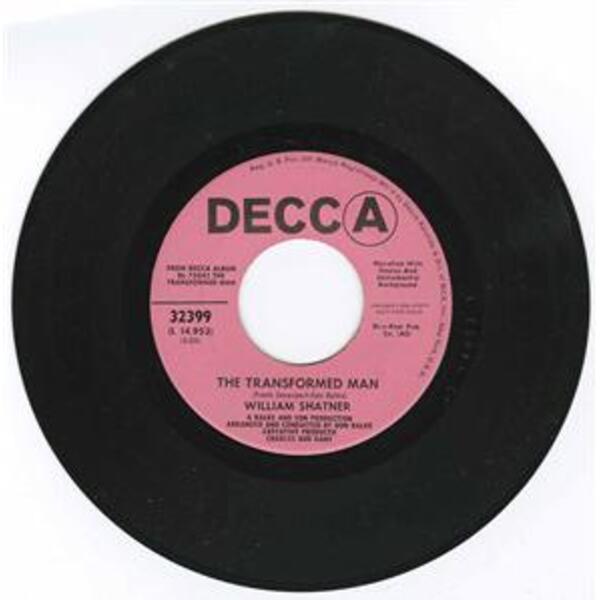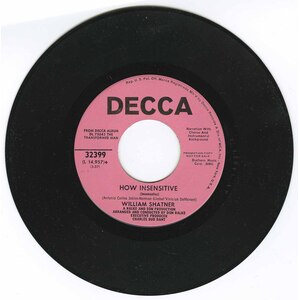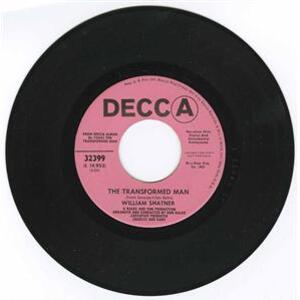Information/Write-up
The Transformed Man is actor William Shatner’s debut album, released in 1968, while the original Star Trek series, in which he starred as Captain James T. Kirk, was still on the air. The album is best remembered for showcasing Shatner’s now-famous vocal style”” spoken word – with a number of dramatic pauses and flourishes and some of these performance are stand outs on the Rhino Recrods’ “Golden Throat” series.
Shatner’s first album The Transformed Man still stands as a classic in the “novelty / celebrity camp” department and deservedly so, as listening to this album is an utterly perplexing experience. If the quality of an album would be measured by how loud the listener yells “WHAT THE FUCK IS THIS?” while hearing it for the first time, then this album would be one of the most impressive ones to ever appear on this website. Many celebrities – mainly actors, the vain breed – have recorded and released music (ever heard Leonard Nimoy, Don Johnson and Bruce Willis?), but no one did it with as much conviction, insanity and hubris as good ole Captain Kirk of Star Trek. Not even David “I’ve been looking for freedom (and found it on a beach)” Hasselhoff, who by all accounts is a bad-ass motherfucker you don’t wanna mess with.
In the totally serious liner notes, Shatner tells you how the project came to be and how he’d always had the ambition to do “something with the spoken word combined with the magic of music.” Ideas actually turned into plans, the “right” people got together and Shatner did get his record”¦ which consisted of parts of Shakespeare (“Henry the Fifth,” “Hamlet” and “Romeo and Juliet”) and poems by Frank Devenport set to music, as well as reinterpretations of Dylan’s “Mr. Tambourine Man” and The Beatles’ “Lucy in the Sky with Diamonds.” And the results”¦ they’re astounding, bigger than life mini-operas that somehow managed to combine ultra-expressive and loud music (Stravinsky-meets-Bernard Herrmann!) with Shatner’s hilarious spoken word-parts. Of course, he’d already had some experience with the clumsy dialogue of the Star Trek series, but here he easily surpasses himself and turns in classic performances that are so mannered, pompous and theatrical that you just don’t know whether he’s serious or messing around with whoever was/is stupid enough to listen.
During “Henry the Fifth,” he delivers an impressively fiery speech inciting an army to fight, while the love-story of “Romeo and Juliet” is told as if he’s telling a few 4 year-olds about Bambi and the baby Jesus. The music in the meantime usually adapts itself to the vocals. One moment, your speakers will be terrorized by militaristic salvos and grotesque crescendos, the next moment (“Elegy for the Brave”) it transforms into a kind of slick, campy lounge that could be used for a French soft-porn flic. Nothing is held back: harps, bassoons, sudden trumpet interruptions, ringing sleigh bells, flutes, tension-creating percussion – it all serves to create an effect that’s as artificial as Shatner’s art. It never really works though, as the man’s intonation and (unintentional?) sense of humour steal the show over and over again. Just check out how he starts saying “Mr. Tambourine Man”¦ hey, Mr. Tambourine Man”¦ hey, Mr. Tambourine Man???” while some idiot is beating himself to a pulp with a tambourine. It’s classic material. Even better – although you could also call it a gruesome massacre as well – is the total demolition of “Lucy in the Sky with Diamonds,” where the Cap’ goes into realms of overacting where no one ever went before. It’s embarrassing and mind-boggling, but also good for a few laughs, although I wonder what The Beatles actually thought at the time. Because of their popularity and the treatment they’re given, the popular songs are the most interesting here, although the closing track (according to the liner notes a three-movement form: “earthly unreality – transitional awareness – contract with divinity”) is also worth a few listens. Because of its bizarre portentousness and Shatner’s side-splitting approach, it works much better as comedy than music, but it’s also extremely cool to file The Transformed Man between Del Shannon and The Shirelles. Or Saxon and Slayer, if you’re into a different style of music.
-Guy Peters



No Comments